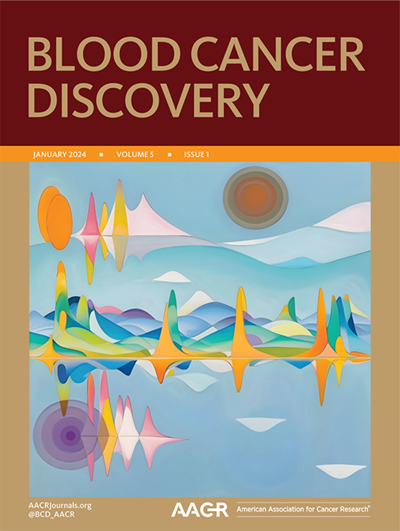急性髓系白血病对过继t细胞治疗反应性的悖论。
IF 11.5
Q1 HEMATOLOGY
引用次数: 0
摘要
自从认识到同种异体移植物抗白血病效应以来,急性髓性白血病(AML)已被确定为T细胞可靶向的恶性肿瘤,但现代形式的免疫治疗的成功比预期的要慢。在这一期中,我们讨论了最近报道中揭示的用T细胞疗法治疗AML的生物学障碍,包括Tin及其同事对T细胞介导的杀伤的AML耐药性的机制见解。参见Tin等人的相关文章,第217页。本文章由计算机程序翻译,如有差异,请以英文原文为准。
The Paradox of Acute Myeloid Leukemia Responsiveness to Adoptive T-cell Therapy.
Since the recognition of the allogeneic graft-versus-leukemia effect, acute myeloid leukemia (AML) has been identified as a T cell-targetable malignancy, but success with modern forms of immunotherapy has been slower than anticipated. In this issue, we discuss the biological barriers to the treatment of AML with T-cell therapy revealed by recent reports, including mechanistic insights into AML resistance to T cell-mediated killing by Tin and colleagues. See related article by Tin et al., p. 217.
求助全文
通过发布文献求助,成功后即可免费获取论文全文。
去求助
来源期刊

Blood Cancer Discovery
Multiple-
CiteScore
12.70
自引率
1.80%
发文量
139
期刊介绍:
The journal Blood Cancer Discovery publishes high-quality Research Articles and Briefs that focus on major advances in basic, translational, and clinical research of leukemia, lymphoma, myeloma, and associated diseases. The topics covered include molecular and cellular features of pathogenesis, therapy response and relapse, transcriptional circuits, stem cells, differentiation, microenvironment, metabolism, immunity, mutagenesis, and clonal evolution. These subjects are investigated in both animal disease models and high-dimensional clinical data landscapes.
The journal also welcomes submissions on new pharmacological, biological, and living cell therapies, as well as new diagnostic tools. They are interested in prognostic, diagnostic, and pharmacodynamic biomarkers, and computational and machine learning approaches to personalized medicine. The scope of submissions ranges from preclinical proof of concept to clinical trials and real-world evidence.
Blood Cancer Discovery serves as a forum for diverse ideas that shape future research directions in hematooncology. In addition to Research Articles and Briefs, the journal also publishes Reviews, Perspectives, and Commentaries on topics of broad interest in the field.
 求助内容:
求助内容: 应助结果提醒方式:
应助结果提醒方式:


